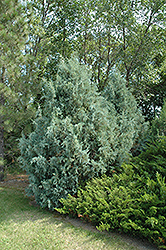Wichita Blue Juniper
Juniperus scopulorum 'Wichita Blue'
Height: 13 feet
Spread: 5 feet
Sunlight:
![]()
![]()
Hardiness Zone: 3
Other Names: Colorado Redcedar
Description:
An upright, pyramidal evergreen growing into a tall conical shrub, with soft textured stunning blue foliage all season long and showy blue berries, excellent choice for difficult landscape situations, makes an effective evergreen hedge
Ornamental Features
Wichita Blue Juniper is a dwarf conifer which is primarily valued in the landscape for its distinctively pyramidal habit of growth. It has attractive silvery blue evergreen foliage. The scale-like sprays of foliage are highly ornamental and remain silvery blue throughout the winter. It produces silvery blue berries from late spring to late winter.
Landscape Attributes
Wichita Blue Juniper is a multi-stemmed evergreen shrub with a distinctive and refined pyramidal form. It lends an extremely fine and delicate texture to the landscape composition which can make it a great accent feature on this basis alone.
This is a high maintenance shrub that will require regular care and upkeep, and is best pruned in late winter once the threat of extreme cold has passed. Deer don't particularly care for this plant and will usually leave it alone in favor of tastier treats. It has no significant negative characteristics.
Wichita Blue Juniper is recommended for the following landscape applications;
- Accent
- Vertical Accent
- Hedges/Screening
- General Garden Use
Planting & Growing
Wichita Blue Juniper will grow to be about 13 feet tall at maturity, with a spread of 5 feet. It tends to be a little leggy, with a typical clearance of 2 feet from the ground, and is suitable for planting under power lines. It grows at a slow rate, and under ideal conditions can be expected to live for 70 years or more.
This shrub does best in full sun to partial shade. It is very adaptable to both dry and moist growing conditions, but will not tolerate any standing water. It is not particular as to soil type or pH. It is somewhat tolerant of urban pollution. This is a selection of a native North American species.
